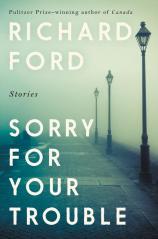Sorry for Your Trouble: Stories
Review
Sorry for Your Trouble: Stories
Richard Ford has always been a reliable source of elegant, thoughtful fiction. SORRY FOR YOUR TROUBLE, his new short story collection, only extends that level of literary quality into the middle of the Pulitzer Prize winner’s eighth decade. Every one of the nine stories here reveals the steady hand of a master of the form, practicing his craft with confidence and grace.
In terms of dramatic action, most of the stories in the collection, its title recalling a familiar expression of condolence, are modest affairs. They’re set principally in near present, in locations that include New Orleans, Maine and Ireland, all places where Ford has lived for extended periods. Save for “Displaced,” which takes place around 1960 in Jackson, Mississippi, Ford’s birthplace, and “Jimmy Green — 1992,” set in Paris, they all take place in, or close to, the present day. Typically, they feature a male protagonist in late middle-age, usually a professional (lawyers seem to predominate) or successful businessman, often someone in the aftermath of a divorce or the death of a spouse, occasionally both, as in “Second Language,” the lengthy story that concludes the volume.
"Every one of the nine stories here reveals the steady hand of a master of the form, practicing his craft with confidence and grace."
Whether it’s missed connections, as in “Nothing to Declare,” where two former lovers meet by chance after 35 years in a New Orleans bar and share a stroll along the Mississippi River, or “Displaced,” the only first person story in the collection, where the 16-year-old narrator, in the aftermath of his father’s death, briefly falls under the influence of a questionable young man a few years his senior, Ford excels at piercing the dark heart of loss. There is nothing maudlin or sentimental about his perspective; rather it is a clear-eyed assessment of how we encounter these empty spaces in our lives and, willingly or not, move on.
The two longest stories in SORRY FOR YOUR TROUBLE feel as if they share that same beautiful DNA of longing. In “The Run of Yourself,” New Orleans estate lawyer Peter Boyce returns to spend the month of August in a different house in the same Maine seaside town where his wife committed suicide two years earlier, finding how, upon his return, “from the beginning Mae’s sudden absence had been bludgeoning; shocking for her to be missing, even from a house where she’d never set a foot down.” But even that absence is tempered by a sense that, “for an instant, then, it became almost a relief, her absence a comfort, a presence. And then the abject gallows-drop of clear fact.”
After an unpleasant visit from a daughter, who’s “angry at everything,” Peter decides to stop for a nightcap at a local bar. There the man who thinks of himself as a “born listener, a man who paid attention,” strikes up a conversation with an amiable, if vacuous, young woman named Jenna, who accompanies him home, where Ford steers the story in an unexpected direction. By the end, he realizes that “Everybody must experience --- when calamities came down --- that it’d been a dream from which you’d wake and things would be as they’d been.”
“Second Language” follows the short-lived second marriage of Jonathan Bell, a wealthy former petroleum engineer and widower now living in Manhattan, and Charlotte Porter, a high-end realtor who sells him his New York home and marries him three months later. Charlotte quickly realizes --- ruefully, but without any sense of true dismay --- that “their goals were different,” and that divorce “would be a much better and easier state to maintain than marriage.” At her instigation, the marriage ends amicably, and the second half of this novelistic story patiently explores the truth of her observation.
Ford is at his best when he allows carefully paced stories like these room to breathe, like the fine wine one of his characters might consume. For that reason, a couple of the entries, like “Crossing,” the story of an American lawyer on a ferry from Wales to Ireland, where he’s going to finalize the paperwork on the divorce settlement with his Irish ex-wife, or “Free Day,” which describes one of the periodic assignations at a Dublin airport hotel of an adulterous couple, the woman understanding her lover is “no one she’d choose for life,” as she experiences the “tedium of a long affair,” aren’t as fully satisfying.
Ford’s writing is distinguished by the economy of its expression, and the seemingly effortless ease with which keen insights slip into his narratives. “No matter how patented life’s course seems when you are leading it day to day, everything could always have been much different,” muses the young protagonist of “Displaced,” displaying a wisdom that belies his years. It’s a thought that echoes this one from “Crossing”: “A moment can come from nowhere and life is re-framed. Stupid. But we all know it can.” One closes the book on a typical Ford story feeling just a bit wiser, more reflective, understanding that for all the pleasure of reading him in the moment, one’s true enjoyment will linger over time.
Reviewed by Harvey Freedenberg on May 15, 2020
Sorry for Your Trouble: Stories
- Publication Date: February 16, 2021
- Genres: Fiction, Short Stories
- Paperback: 272 pages
- Publisher: Ecco
- ISBN-10: 006296979X
- ISBN-13: 9780062969798



